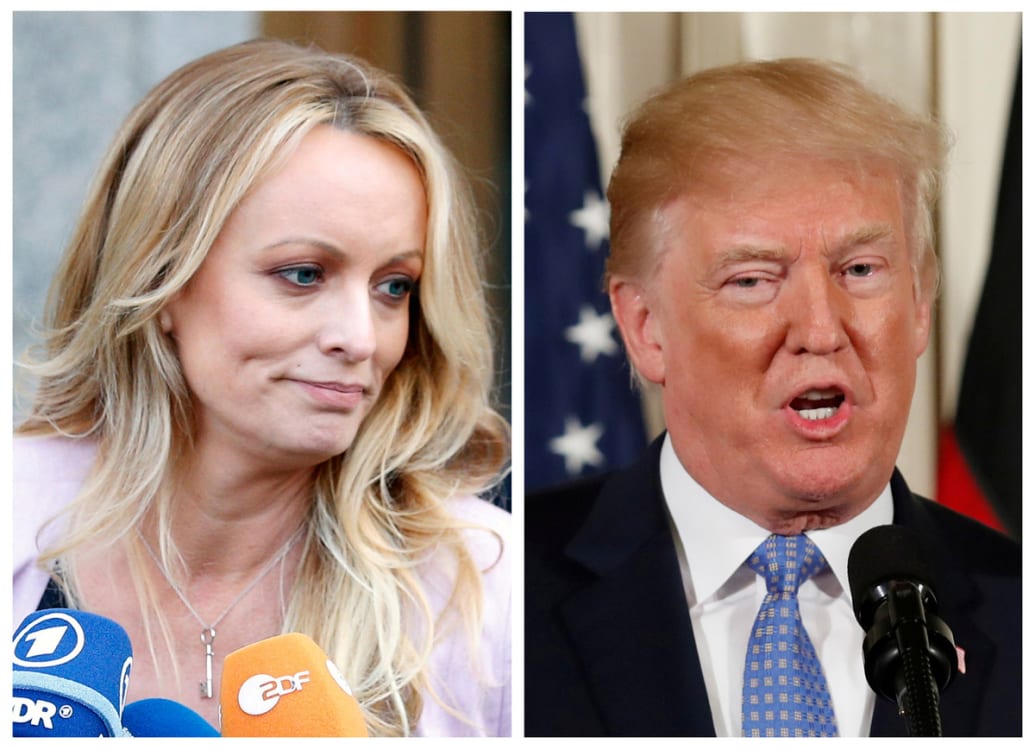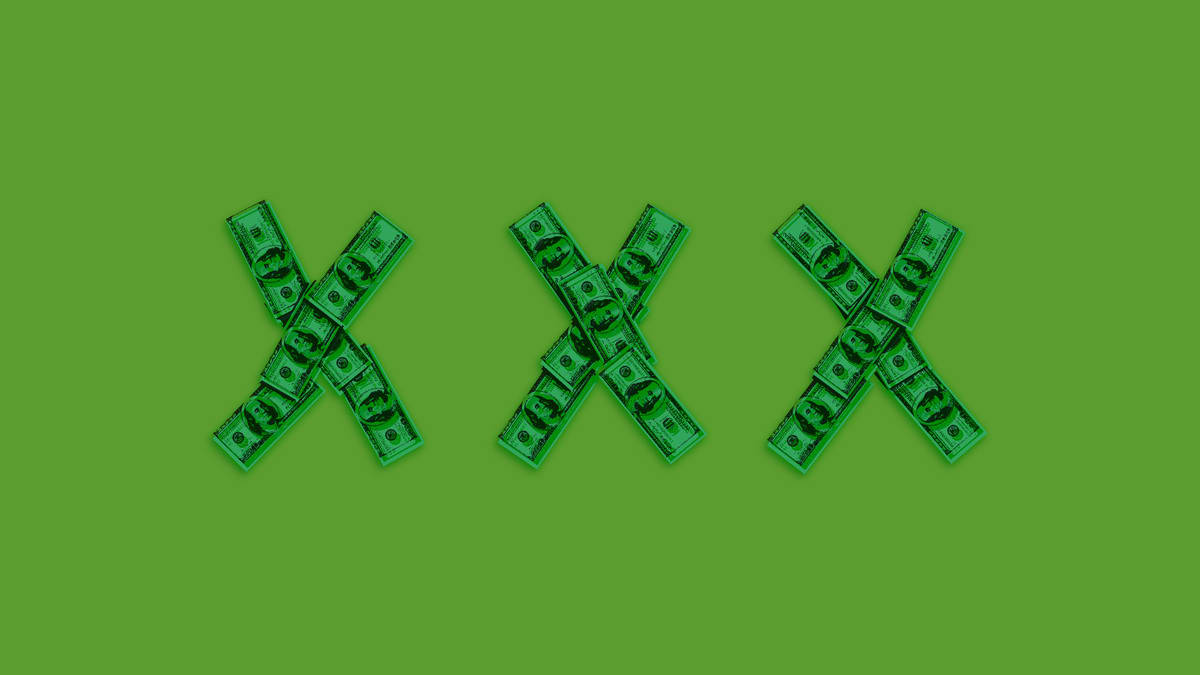Pay Dirt is a weekly foray into the pigpen of political funding. Subscribe here to get it in your inbox every Thursday.
We’ve all been there.
You’re running for federal office, the race is hot, the polls are tight, but you’re doing OK. Then, whammo: A porn star informs you that she’s about to tell the world you had an extramarital affair with her a few months after your wife gave birth to your youngest child.
What do you do?
You pay her off, of course.
Well, let’s not be hasty. Maybe you should deny and ride it out—an especially appealing option if it was a lie or a dubious claim that the vast majority of people, including your wife, would not find credible. Joe Biden did this in 2020 and won.
But you’re not Joe Biden. You’re a self-aggrandizing womanizer with a known history of extramarital affairs and allegations of sexual misconduct. Worse, one day before this porn star approached you, the world learned that—right around the time of this alleged affair—you’d also been caught on tape bragging that you’re so famous you can do “anything” you want to women, like, for instance, “just start kissing them” or “grab them by the pussy.”
Yikes.
Your political allies, many of them already holding their noses at your candidacy, began to retreat. Party leaders denounced you, and some officials demanded that you drop out of the race. You got dissed by your own running mate. You had also apologized for that behavior just the day before, publicly pledging to “be a better man tomorrow.”
The election is only weeks away. You almost certainly would not survive it, you can’t talk the woman down, and the clock is running out. You also happen to have a lot of money and no shame.
So you pay her off.
But how do you do it? Is it even legal? If so, are there some ways that might be illegal? You don’t want anyone to break the law—right?
This is the pickle that Donald Trump found himself in when he allegedly directed his on-again, off-again personal attorney Michael Cohen to purchase the silence of Stormy Daniels, then reimbursed him with corporate funds falsely labeled as “legal expenses” for a retainer that didn’t exist.
Federal prosecutors have called this scheme illegal, and Cohen did prison time for it after pleading guilty to his role and implicating Trump directly. Later, the Federal Election Commission’s Office of General Counsel found reason to believe that Trump, Cohen, the Trump campaign, and the Trump Organization had all violated campaign finance law.
Legal experts told The Daily Beast that the scheme raised several issues. The apparent violations were also laid out in the DOJ’s filings against Cohen and the FEC’s general counsel report.
While non-disclosure “hush money” settlements are not in themselves illegal, these experts say that Cohen, Trump, and the Trump Organization had devised an unlawful arrangement. Today, that arrangement—for which Trump, unlike Cohen, has not been held legally accountable—appears poised to yield the first ever indictment of a former U.S. president. (Though those Manhattan prosecutors may need to step lively to beat out other contenders with strong cases against Trump.)
Paul S. Ryan, a campaign finance law expert who filed the first FEC complaint about the payments, explained the setup.
“Federal law defines campaign expenditures as any money spent for the purpose of influencing an election. These hush payments were clearly and provably for the purpose of influencing the election, and were therefore clearly political expenditures under federal law. They would not have been made but for the looming election. That is the proof that these were political,” Ryan said.
“Under the law, such a payment from Cohen, Trump, and the Trump Organization qualifies as an in-kind contribution, which is ‘anything of value’ given to a candidate,” he continued. “These payments meet those definitions.”
Brendan Fischer, campaign finance law specialist and deputy executive director at the watchdog group Documented, told The Daily Beast that transparency is at the core of the scandal.
“One of the key foundations of election law is that voters have a right to know who they’re voting for, how those candidates are spending money, and what they’re doing to get elected,” Fischer said. “These payments deprived voters not only of the knowledge of the allegations, but of the fact that Trump had paid to do so.”

A combination photo shows Stormy Daniels speaking in New York City, and Donald Trump speaking in Washington, Michigan, on April 16, 2018 and April 28, 2018 respectively.
Reuters
However, Fischer said, “there are a number of arguably legal ways that Trump could have made the payment without tipping off voters.”
When Trump was first presented with the opportunity to strike an NDA with Daniels, he had a few options. He could pay her personally. He could have someone else handle the payments and reimburse them later. Or, he could pay her through the campaign.
The most clear legal path, surprisingly enough, is the campaign.
“In the 2020 cycle, Trump pioneered extraordinary ways to obscure where the campaign money was going,” Fischer pointed out, referencing a shell company that handled nearly a billion dollars in campaign payments. “If he had gone that route in 2016, not only might we never have learned about the secret payments to the former porn star, but he might also not be facing indictment.”
Had Trump used donor money to pay off Daniels, and if the campaign had disclosed that expense appropriately, he could have structured it as a legal transaction. The difference, of course, is that it would also be a public one—but even that could be limited.
First, the campaign likely would have made the settlement payment to a law firm, not to Daniels directly, and the questions would quite likely have stopped there. In fact, the Trump campaign has paid settlements this way a number of times—including in 2016—with some of the arbitration fees appearing in FEC reports.
Some legal experts have argued that if Trump had indeed paid with donor money, that could also be construed as illegal—converting campaign funds to personal use. (Expenses a person would have incurred “irrespective” of a campaign.) To that point, some Trump defenders have cited the fact that Daniels first tried to sell her story in 2011—years before the campaign.
However, Daniels was also acting in the context of a presidential campaign—while Trump was publicly entertaining a potential 2012 run. Daniels struck an agreement to run the story in Life & Style in April 2011, and Trump dropped his bid the next month. The magazine pulled the plug on Daniels that same month, and Trump associates had also allegedly threatened her.
Brett Kappel, campaign finance specialist at Harmon Curran, remarked that the fact Trump hadn’t paid through the campaign was “somewhat surprising,” given that history.
“It is somewhat surprising that he didn’t just use a law firm to hide the payment of campaign funds to Daniels as a legal settlement,” Kappel told The Daily Beast. “That’s what they began doing during the 2016 campaign and have continued to do ever since up to today.”
He added that the decision “may have been due to the fact that the payment had to be made so quickly before the election.”
Those campaign settlements, such as a $303,000 case last year, appear to involve the campaign NDA, which courts have found to be so broad that it’s “unenforceable.” The arrangement with Daniels was also found unenforceable, and in 2020 a court ordered Trump to pay Daniels $44,100 in attorney fees.
Ryan said that in such instances, it wouldn’t be inappropriate in the eyes of the FEC to list a settlement paid to a law firm as “legal fees” for the purposes of disclosures—noting, like Kappel, that Trump has taken this same route regularly.
“It’s a different question than the question of claiming you paid Cohen a ‘retainer’ for ongoing legal services that were never retained,” he observed.
Fischer noted that while voters and journalists would have seen the payment to a law firm with a vague description, such a disclosure “likely would not have revealed the story behind that payment.”
What’s more, thanks to FEC filing schedules, the public would not have known before the election.
Had the payment gone through when Daniels first approached Cohen on Oct. 8—or at any time up until Oct. 19—the transaction would have appeared on the campaign’s pre-general report, which would have been published Oct. 27, before the election. But the actual payment, made on Oct. 26, would have surfaced in the post-general report, in December.
It’s unclear whether any campaign officials advised Cohen on the payment. It’s also unclear whether anyone on the campaign beyond Trump and Cohen even knew—Cohen’s charging information leaves that possibility open, citing coordination with “one or more members of the campaign.”
“If Trump had made an effort to do this properly from the beginning, it all would have played out much differently,” Ryan said. “They in all likelihood would have avoided this cascade of dominoes that has left him in the position he is today.”
Subscribe to the Pay Dirt newsletter here to follow the movement of the dirty dollars influencing our public policy.

